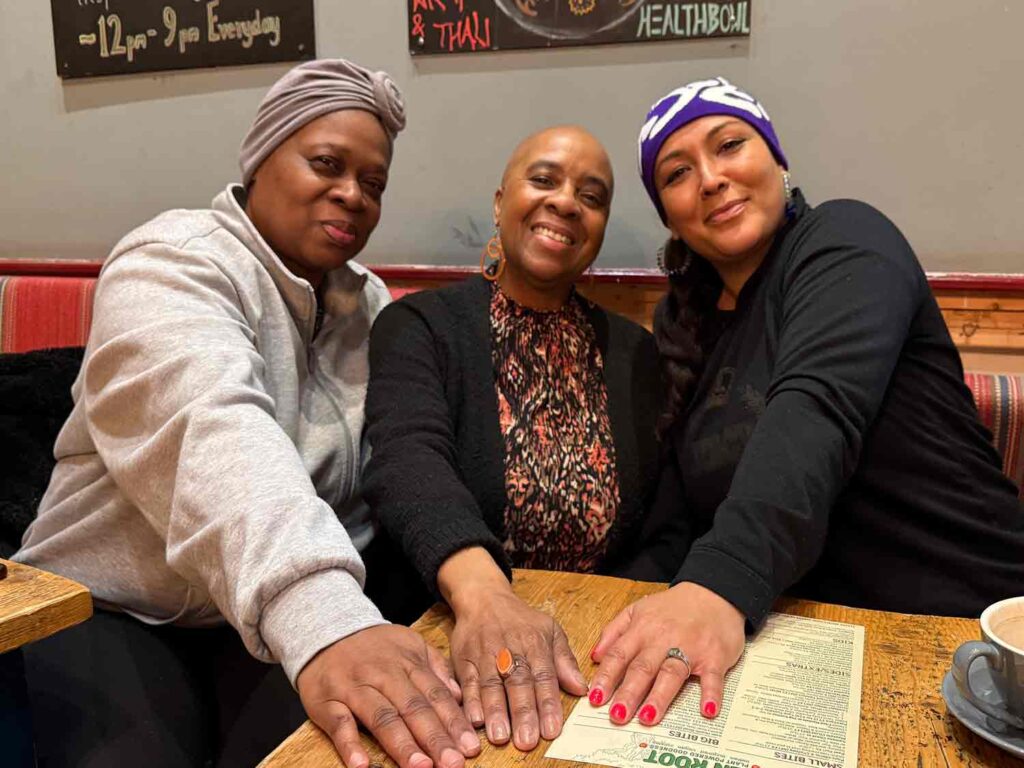Community is a word you hear a lot in Lambeth. Easy to say, but a lot of hard work to create and continue. Alan Slingsby met three people who have put in that hard work and explain how they got help and support that are available to anyone in the borough who is or who wants to contribute to our community

An invisible network runs through Lambeth. It involves many scores of people across a range of ages and walks of life.
One thing they have in common is a dedication to helping other people and their communities.
The Community Connectors network helps them with the skills and resources they need to amplify their commitment to making the borough a better place to live.
With new rounds of training for the project coming up, three connectors got together with the Blog to explain how Community Connectors works and how anybody can get involved.
Community activism
Michelle Killington has a long history of community activism in Brixton’s Angell Town and beyond.
She, like Marcia Jones and Betty Efemini, took part in a free four-day course organised by Project Smith, a project funded by the local NHS and run in conjunction with the council that was set up in 2017.
A resident of Brixton’s Angell Town, she formed a residents’ group to campaign for a community centre in the area.
The campaign has been a great success, securing a £1m guaranteed investment from Lambeth council.
Michelle won a wellbeing fund grant as a Community Connector three years ago to run, Boxercise, a summer boxing programme for women in the community.
This project continues weekly on a Monday evening (7.30–9pm) at the Moorlands estate community centre in Brixton, focusing on health and wellbeing. Moorlands residents attend for free.
Wellbeing
The four-day Community Connectors courses run from 9.30 in the morning to 3 in the afternoon and end with a multiple-choice test and certificate.
Skills that are passed on include talking to people about their wellbeing; things that they can do for themselves; and places to go to access help and support.
The training is interactive with plenty of opportunities for discussion.
“It’s such a supportive group of people who are all doing it for the right reasons and you all connect automatically – so I enjoyed my training,” says Betty,
Betty’s community building is not confined to Lambeth – or even Britain – she has received major grants from Lewisham council and done skills training in Rwanda, Tanzania, Kenya and Zambia.
She is director of Holistic Well Women, a not-for-profit community interest company, which received funds from the Lambeth Wellbeing Fund and the Furaha Social Creative and Wellbeing Project which helped improve the mental and wellbeing of the diverse community in Southwark. This led to three years of funding from South East London Mind in Lewisham.
Grants and safaris
The Community Connector programme does not end with the presentation of a certificate.
Successful participants have a better chance of accessing grants of between £1,000 and £5,000 that are available to Community Connectors for their projects.
There is a monthly catch-up meeting for Connectors known as the safari – because it involves an in-depth visit to a place or organisation in Lambeth to do with health or wellbeing. “It’s like Through the Keyhole on steroids for community groups,” says Michelle.
One example of how Community Connectors works was Michelle visiting Coin Street Community Builders which famously created housing and more for local people on a Southbank site.
She gained insight into the complex business models involved in such projects from lain Tuckett, director of Coin Street Community Builders, who later came to talk to Angell Town residents about how it was done.
Girls’ night in
Marcia was a community builder long before she became a Community Connector.
“Sister2SisterBU started as a girls’ night in, on a Friday in my front room – 23 years ago now,” she recalls.
“Once a month we just rocked up. I didn’t know who half of them were really.” People brought their friends and sisters.
“Over time, it came out of my front room because it got too big. Then I used spaces in the community. I hosted music nights and other successful events.”
Marcia also led Saturday-morning breakfast chills, which ran for 10 years until last year.
“That whole thing about wellbeing, creating a space and connecting women together, that has always been my baseline,” says Marcia. “Just seeing women become who they want to be and can be.
“During the lockdown, when nearly the whole world discovered Zoom, all my events went online.
“I launched my menopause support group in November 2020. Then in 2021 I was blessed to receive funding from Project Smith.
“Centre 70 [in West Norwood] became my nurture organisation.
“After the first year, they contacted me and said ‘we absolutely love what you do and we’d like to work with you. So, we’d like to offer you some more funding for next year’.
“This is the third year of that funding that they’ve given me.
“It means that women can access the services for free. The funding pays for venues, guest speakers, other expenses and it’s just going brilliantly
Art and performance
Michelle, with another project just taking off, mentors and collaborates with young people through Empower From Within, which has a monthly residency at Bricks, also known as Ton of Brix, on Brixton’s Coldharbour Lane. It provides a space for reflection and addressing issues young people face through art and performance – from spoken word to DJing.
She has already run a pilot for the event at Bricks. The next is due to happen on 23 January from 7 to 11pm.
Course details
The next Community Connector courses are from 30 January to 5 February, and 6 to 18 February.






